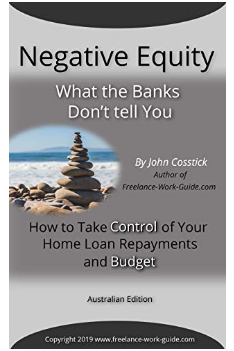This article is aimed at making sure you do some research and question preparation prior to going to see a financial planner for specific advice about your situation.
This is a general education article only as I am not aware of your personal situation. It is important that you prepare questions for your financial planner to answer when you meet.

Tragic and almost impossible to manage, negative equity is something that no family should ever have to endure. Unfortunately, in many cases, it can’t be helped, especially when higher forces are at play, like a sudden economic downturn or an unexpected decline in property market values in your area.
If in case the damage has been done, there’s nothing left to do but to think of ways to manage negative equity. Whether you’re flying solo in life or with family, one of the most simple things you can do to minimize the impact of negative equity is to increase your income.
However, it is easier said than done-when it comes to expanding your income, the biggest challenge is finding other income sources without sacrificing your existing work.
This is where freelancing comes to play. Freelancing, to those without the slightest idea about it, is simply doing ‘freelance’ or part-time work online for one or various clients.
The scope of freelancing is rather vast-freelancers range from graphic designer, teacher or writer to project manager, lawyer or accountant. As long as you’re working as an independent contractor online (usually without exclusivity to a specific client), you’re a freelancer.
So, freelancing and negative equity-how do these two go together? Yes, they do! To help you understand more about negative equity and how freelancing can help, we’ve laid out 10 negative equity and freelancing related questions/concerns and their answers.
1. What is negative equity and how it can cost you money?

Negative equity is when your property value drops significantly below your outstanding loan/mortgage for your property.
For example, you owe $500,000 for your house but its current market value is only at $350,000. Because of this, if you sell your home today to pay for your loan, you’ll still be in debt.
Negative equity usually occurs when you purchase a property/home before a Recession (or a Depression) or prior to the collapse of a housing bubble. However, negative equity can also happen when:
There’s a decline in the market value of a mortgaged property
You decide to take a second mortgage home equity loan and the value of the two loans combined exceeds your property’s current value
The original loan amount was too generous
2. How to save money with fixed-rate housing loans
While fixed-rate housing loans are usually higher than an adjustable rate mortgage (ARM) or variable rate loans, they can give you more savings in the long run.
Having a fixed rate loan protects you from an upsurge in interest rates-and this is especially helpful if your budget can’t handle additional expenses in the future.
3. Understanding your mortgage and the financial risks
Whether you’re already in negative equity or just contemplating on taking out a loan for your first property, it is important to analyse your mortgage and financial risks before diving in.
It is important to understand the difference between a fixed rate and an adjustable rate mortgage and what it means to have one.
An adjustable-rate mortgage (ARM) is where the interest rates of the loan depend on the rise and fall of the market interest rate. This usually starts off low, but it has the potential to increase or decrease depending on market fluctuations in the future.
A fixed rate mortgage is exactly what it is-a fixed rate interest mortgage. Unlike the ARM, the fixed rate mortgage does not increase or decrease based on market trends-it is the same until the end of your loan (be it 5 years or 20 years).
If you want a lower rate loan, you can consider going for an ARM. However, with an ARM, you should be ready in case of interest rises in the future. On the one hand, if you think your budget can’t take any more rate hikes in the future, a fixed rate mortgage is a safer option.
4. Helping your financial planner manage your housing loan risks
In any case, you should consult with a financial planner to determine the loan that’s best suited to your needs.
Besides discussing the types of loans available for you, your financial planner will also discuss flexible loans, prepayments, possible penalties and everything you need to know when it comes to your mortgage.
5. Why you should lift your income to repay negative equity
Negative equity is a nightmare. Unless you come across a windfall and use it to help you pay your negative equity, the next best thing to do is to find ways to increase your income. While you can wait out the effects of dwindling market prices on your property, not everyone has the luxury of waiting out the market.
Finding ways to expand your income is a great way to help you prepay (or make advanced payments) your mortgage so it can cushion, even just for a little bit, the effects of negative equity.
6. Moving house when you are in negative equity
Can you move while in negative equity? The answer is yes! Experts say that you can actually “move house without having to pay off the negative equity on your mortgage”.
Some lenders will allow you to move and take your negative equity with you and transfer the negative equity on a new property (through a “negative equity mortgage”). Others will allow you to re-mortgage to a new deal.
In the end, your options will depend on what offers are available for you from your lender.
Your lender will have to consider several factors, like your repayment history, the value of the new property, or the down payment you’re able to provide for your new home.
You can ask your financial adviser and your lender for your options.
7. Preparing for an interest rate rise
How the interest rate hike affects your mortgage will all boil down to the type of mortgage you have. If you have a fixed rate loan, you’re unlikely to get affected by these interest rate rises in the future. However, if you have a variable rate/adjustable rate mortgage or a tracker loan, you’re likely to feel the impact of the interest hike almost immediately.
A few ways to prepare for an interest rate rise (whether this is looming or not) are the following:
Save as much as you can
Prepay your mortgage (but check how much you can overpay without being charged with extra fees)
Refinance into a fixed rate mortgage
Improve your credit score so you can refinance into better deals in the future
8. How to lift your family income
One of the ways to lift family income without changing too many variables in your life is to do online freelancing.
With freelancing, you’re basically taking your free time and using that time to work so you can increase your income. You can start freelancing with zero cost and less effort as opposed to working additional desk or traditional jobs.
Let’s say you’re a teacher. You can work online as a virtual tutor, either via ESL (English as a Second Language) learning platforms or by advertising your skills through online marketplaces, social media or even your community.
By doing this, you are saving time and effort-you won’t have to make an additional commute or any other expense increase that’s related to looking for another job in the physical world.
With freelancing, there are so many online marketplaces you can choose from-Upwork, Guru, Fiverr, Freelancer and many more-depending on your skills or hobbies.
Most clients would hire you not because of your educational attainment or existing certifications for a specific job-most would hire you for skill and what you can actually do to help them.
9. New Economy and the Future of Work

Today, more and more individuals are transitioning from traditional employment to service-based jobs, thanks to the connectivity offered by the internet.
Freelancing is a rising movement all over the world, thanks to its benefits like the following:
Flexible time
Ability to work from home
Unlimited sources of income
Less demanding work arrangements
Although it is hard to determine exactly how many jobs are there in the market (it’s practically limitless), here are a few common online job opportunities available for you:
Virtual assistant
Writer
Graphic designer
Web designer
Freelance accountant
Freelance lawyer
Social media manager
Project manager
…and so much more!
There are numerous online skill assessment tools available on the web, in case you’re still doubtful of your skills as a first-time online freelancer. However, it is likely that you already have an idea on which strengths to capitalise on and from there, you’ll be able to work out which skills you can offer to various clients online.
10. The importance of work-life balance

While you may get caught up with finding ways to stretch your income through working extra jobs to solve negative equity, having a good work life balance should still be a priority.
Spending time with your family (or at least having enough time to rest) works wonders for your health. We all know that stress contributes to chronic diseases (not to mention early death), so it is important to take a break from all the work and actively find time to relax.
Freelancing does not require you to operate in a high-stress environment (like a physical office with a physical boss) and gives you the freedom to choose when or where to work. It is a good choice when looking for extra ways to earn income to manage negative equity, as it offers a chance for you to earn more while also offering a better work-life balance.
If you need more information on how freelancing can help you manage negative equity, you can check out this eBook, Negative Equity – What the Banks Don’t Tell You: How to Take Control of Your Home Loan Repayments and Budget“.
If you have already decided that you want to lift your income by freelancing and are not too sure how to go about it, you can check out this eBook, “How to Be Self-employed: A Freelance Work from Home Guide“.

Click here: Negative Equity – What the Banks Don’t Tell You: How to Take Control of Your Home Loan Repayments and Budget
Read my “How To Be Self Employed” e-book
Disclaimer
Whether we provide freelancers with general operational tips to improve productivity, skills, life hacks or questions to ask professionals these or any other freelance related activity articles should not be viewed as a substitute for personal professional advice. These articles are aimed at being general freelancing educational material and not personal advice. If there is any doubt we recommend seeking specific personal professional advice related to your situation.















